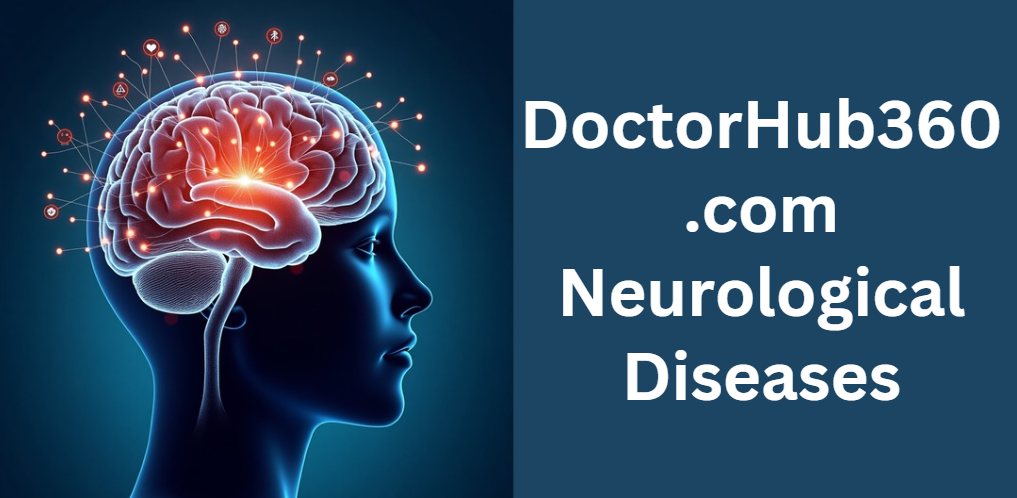DoctorHub360.com Neurological Diseases – The Ultimate Comprehensive Guide
Neurological diseases encompass a broad spectrum of conditions that affect the central and peripheral nervous systems. With increasing public interest in understanding these complex disorders, the need for clear, accessible, and reliable information is more critical than ever.
Doctorhub360.com neurological diseases serves as a trusted resource where readers can gain a solid understanding of various neurological conditions, their symptoms, diagnostic methods, and treatment options. This guide is dedicated to helping you navigate the intricacies of neurology while empowering you with knowledge that can lead to better health outcomes.
Understanding Neurological Diseases
Definition and Scope
Neurological diseases are disorders that impact the nervous system, which includes the brain, spinal cord, and peripheral nerves. They range from common conditions like migraines and epilepsy to more complex degenerative diseases such as Parkinson’s and Alzheimer’s. This guide explains how these conditions affect brain function, behavior, and overall health, breaking down complex scientific concepts into language that is easy to understand.
The Science Behind Neurological Disorders
Neurological disorders arise from various biological and environmental factors. The structure and function of neurons, neurotransmitter imbalances, and genetic predispositions all contribute to the development of these conditions. For instance, abnormalities in dopamine regulation are linked with Parkinson’s disease, while disruptions in electrical activity can lead to epileptic seizures.
To provide clarity, consider the following table which summarizes the categories of neurological diseases, examples, and key characteristics:
| Category | Examples | Key Characteristics |
|---|---|---|
| Neurodegenerative | Alzheimer’s, Parkinson’s | Progressive neuronal loss and functional decline |
| Neurodevelopmental | Autism, ADHD | Early onset, impacting brain development and behavior |
| Epileptic Disorders | Epilepsy, Seizure Disorders | Abnormal electrical activity in the brain |
| Inflammatory Diseases | Multiple Sclerosis, Encephalitis | Immune-mediated damage to nervous tissues |
This structured overview helps simplify the complex world of neurological diseases into digestible segments.
Common Neurological Diseases
Epilepsy and Seizure Disorders
Epilepsy is a chronic condition marked by recurrent seizures resulting from abnormal electrical discharges in the brain. Patients with epilepsy may experience a variety of symptoms, ranging from brief lapses in attention to full-body convulsions.
Effective diagnosis involves neurological examinations, electroencephalograms (EEGs), and imaging studies such as MRI scans. Treatment typically includes medications, lifestyle adjustments, and sometimes surgical interventions. Case studies from doctorhub360.com neurological diseases illustrate real-life examples of patients successfully managing their condition through tailored treatment plans.
Parkinson’s Disease and Movement Disorders
Parkinson’s disease is a progressive disorder that primarily affects motor function. It is characterized by symptoms such as tremors, stiffness, and slowed movements. The underlying cause is the degeneration of dopamine-producing neurons in the brain.
Advances in treatment now include not only medication but also innovative therapies like deep brain stimulation, which can help alleviate symptoms and improve quality of life. Research articles featured on doctorhub360.com neurological diseases provide detailed insights into the latest treatment modalities and patient outcomes.
Multiple Sclerosis and Autoimmune Neurological Conditions
Multiple sclerosis (MS) is an autoimmune condition where the body’s immune system attacks the protective myelin sheath surrounding nerve fibers. This results in disrupted communication between the brain and the rest of the body.
Symptoms can vary widely but often include muscle weakness, visual disturbances, and coordination issues. Diagnosis involves a combination of MRI imaging, spinal fluid analysis, and clinical assessments. Emerging treatments, including disease-modifying therapies and personalized rehabilitation programs, are discussed extensively in our guide.
Alzheimer’s Disease and Other Dementias
Alzheimer’s disease is a neurodegenerative disorder that leads to memory loss, cognitive decline, and behavioral changes. It primarily affects older adults and represents one of the leading causes of dementia. The guide explains how early detection through cognitive assessments and advanced imaging techniques can significantly impact disease management. Ongoing research and clinical trials, highlighted on doctorhub360.com neurological diseases, offer hope for improved therapies in the future.
Rare and Less Common Neurological Disorders
In addition to the more prevalent neurological diseases, our guide also covers rare conditions such as Tourette’s syndrome, amyotrophic lateral sclerosis (ALS), and other less common disorders. Although these conditions may affect fewer people, they require specialized attention and research. By presenting clear, concise information, our resource helps demystify these conditions and provides guidance for those affected.
Diagnostic Approaches and Technologies
Traditional Diagnostic Methods
Accurate diagnosis is critical in the management of neurological diseases. Traditional methods include neurological examinations, MRI and CT scans, and EEGs. These techniques help identify structural abnormalities, monitor disease progression, and assess brain function. The step-by-step explanation provided in our guide allows readers to understand how each diagnostic tool contributes to the overall diagnosis process.
Cutting-Edge Technologies
Recent advancements in diagnostic technology have revolutionized the field of neurology. Tools such as genetic testing, advanced imaging techniques, and artificial intelligence-driven analysis now play an essential role in diagnosing neurological diseases more accurately and swiftly. A detailed diagnostic flowchart is provided below to illustrate the process:
Patient Consultation
│
Initial Neurological Examination
│
Laboratory Tests & Imaging (MRI, CT, EEG)
│
Genetic Testing & AI Analysis (if needed)
│
Final Diagnosis & Treatment Plan
This flowchart enhances understanding by visually summarizing the diagnostic journey.
Treatment Modalities and Management Strategies
Medical Therapies
Managing neurological diseases often involves a range of medications designed to alleviate symptoms and slow disease progression. From antiepileptic drugs to dopaminergic medications for Parkinson’s, the guide details how various treatments work, their benefits, and potential side effects. Each medication regimen is explained in context to help patients understand what to expect during treatment.
Non-Medical Interventions
In addition to medication, non-medical therapies such as physical therapy, occupational therapy, and cognitive rehabilitation are crucial. These interventions help improve daily functioning and quality of life.
For example, tailored exercise programs can aid patients with Parkinson’s disease, while cognitive therapies may benefit those with Alzheimer’s. The guide emphasizes a holistic approach by integrating lifestyle modifications and alternative therapies into the overall treatment plan.
Surgical and Technological Interventions
For certain conditions, surgical procedures like deep brain stimulation or minimally invasive neurosurgery can provide significant relief. The guide explains how these interventions are performed and the expected outcomes. It also highlights the importance of a multidisciplinary approach, where surgery is combined with other treatment modalities for optimal results.
Patient-Centered and Personalized Care
A key theme in modern neurological care is the focus on personalized treatment plans. Physicians collaborate with patients to develop strategies tailored to individual needs, ensuring that every patient receives the most effective and compassionate care. Success stories and patient testimonials featured on doctorhub360.com neurological diseases illustrate how personalized care can transform lives.
Research, Innovations, and Future Directions
Current Research Trends
Ongoing research in neurology continues to uncover new insights into the mechanisms underlying neurological diseases. Our guide provides an overview of groundbreaking studies and clinical trials that are pushing the boundaries of treatment. It explains how recent discoveries are influencing current practices and shaping future therapies.
Innovations in Treatment and Technology
Emerging treatments, such as gene therapies and precision medicine, hold tremendous promise for the future of neurological care. The guide discusses these innovations in detail, highlighting their potential to revolutionize how neurological diseases are treated. This section is backed by data and insights from leading research institutions and featured articles on doctorhub360.com neurological diseases.
Policy and Funding Updates
Government initiatives and funding for neurological research play a vital role in advancing the field. The guide includes a discussion on recent policy changes and funding opportunities that support neurological research and patient care. This information is crucial for both patients and healthcare providers to stay informed about the evolving landscape.
Patient Resources and Support Networks
Online and Community Resources
Accessible information and support networks are essential for managing neurological diseases. The guide lists reputable online portals, local support groups, and community organizations that provide educational resources, counseling, and peer support. These resources empower patients and their families by offering reliable, up-to-date information.
Educational Materials and Workshops
Educational programs such as webinars, workshops, and support groups play a significant role in patient education. Doctorhub360.com neurological diseases often features information on upcoming events and learning opportunities designed to help patients better understand and manage their conditions.
Tools for Self-Management
In today’s digital age, several tools and mobile apps are available to help patients track symptoms, manage medications, and monitor overall health. Below is a comparison table of some popular digital tools:
| Tool/App Name | Features | Platform |
|---|---|---|
| NeuroTrack | Symptom monitoring, medication reminders | iOS, Android |
| BrainHealth Manager | Cognitive exercises, progress tracking | Web-based, Mobile |
| MyNeuroDiary | Daily logs, secure data sharing | iOS, Android |
This table provides a quick reference to help patients choose the tool that best fits their needs.
FAQs
How can caregivers and family members best support someone living with neurological diseases?
Caregivers play a crucial role by creating a structured daily routine, encouraging open communication, and accessing professional support services. They can benefit from specialized training and support groups that help them understand unique challenges and learn self-care techniques, ensuring they remain resilient and effective in their roles.
What role does telemedicine play in the management of neurological conditions?
Telemedicine has become an essential tool by providing remote consultations, follow-up appointments, and continuous monitoring for patients with neurological disorders. This technology not only increases accessibility to specialized care but also facilitates timely adjustments to treatment plans, especially for patients in rural or underserved areas.
How do lifestyle choices such as diet, exercise, and stress management impact neurological health?
Lifestyle factors have a significant effect on neurological well-being. A balanced diet rich in antioxidants and omega-3 fatty acids, regular physical activity, and effective stress reduction techniques like mindfulness or yoga can help maintain brain health and may even reduce the progression or severity of certain neurological conditions.
What financial assistance or insurance options are available for individuals managing neurological diseases?
Patients may find support through specialized insurance programs, government subsidies, or community-based financial assistance initiatives. In addition, some non-profit organizations and local health agencies offer grants, discounts, or sliding-scale payment options for necessary medical treatments and therapies related to neurological care.
What are some of the most promising research areas and future trends in the study of neurological diseases?
Current research is exploring advanced areas such as gene therapies, precision medicine, and AI-driven diagnostic tools, which are expected to revolutionize early detection and treatment. Emerging studies on neuroplasticity and the role of the gut-brain axis are also offering new insights that could lead to innovative treatment approaches in the near future.
Conclusion
In summary, this guide on doctorhub360.com neurological diseases provides a detailed and comprehensive overview of neurological conditions, from understanding basic concepts and diagnostic methods to exploring advanced treatment strategies and patient support networks. By breaking down complex information into clear, accessible language, this resource aims to empower readers to make informed decisions about their health.
Whether you are a patient seeking guidance, a caregiver in need of reliable information, or a healthcare professional looking to stay current with emerging trends, this guide is your ultimate resource. Stay informed, engage with the latest research, and take proactive steps towards better neurological health.
Read more
todis 25 anni insieme a voi it: A Comprehensive Guide
Ultimate Guide to pont l’eveque cheese microbiome
Ultimate Guide to hardest degree in guinness world record – In-Depth Analysis & Academic Insights
Comprehensive Guide to retro bowl unblocked games 76
Ultimate Guide to daz studio medical gas mask: In-Depth Review, Setup & Customization






